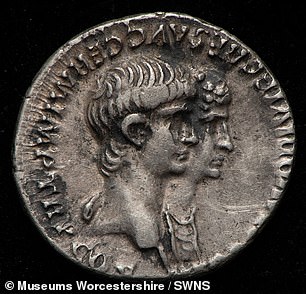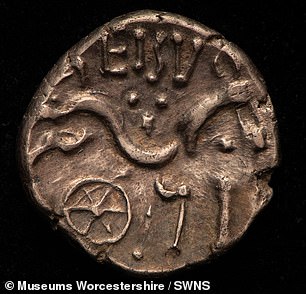A huge hoard of Roman coins is discovered in Worcestershire – and experts predict it could be worth more than £100,000
Builders were stunned to come across one of the largest quantities of Roman coins ever found in Britain – worth more than £100,000.
A total of 1,368 Iron Age and Roman period coins, dating back to the reign of Emperor Nero, were unearthed at a building site near Worcester.
Experts say the ‘miraculous’ find is one of the most important discoveries in a century.
Most of the coins are silver denarii, minted in Rome and dating from the time of the Roman Republic in 157 BC. until the reign of Nero between 54-68 AD.
The Worcestershire Conquest Hoard is one of the largest coin hoards from the Roman conquest period and the largest from Nero’s reign ever found in Britain.
It is believed that the coins belonged to a wealthy farmer who supplied the Roman army with grain and livestock.
The hoard was discovered late last year in the Leigh and Bransford area, west of Worcester, and is worth more than £100,000.
Dr. Murray Andrews, lecturer in British archeology at University College London, said: ‘It is the most amazing thing I have seen in the last hundred years.
Builders were stunned to come across one of the largest quantities of Roman coins ever found in Britain – worth more than £100,000.


A total of 1,368 Iron Age and Roman period coins, dating back to the reign of Emperor Nero, were unearthed at a building site near Worcester.
‘It is an important piece of archaeology.
‘It tells us what happened here 2,000 years ago, when the Malvern Hills may have been the frontier of the Roman Empire.’
The hoard contains a single gold coin that has been identified by experts as an Iron Age stater.
The coin was minted for the local British tribe, the Dobunni, who lived in Worcestershire between 20 and 45 AD.
It is likely that the pot containing the coins was made in one of the pottery kilns at the foot of the Malvern Hills.
It was declared a treasure in June and now Worcestershire Heritage, Art & Museums wants to raise £6,000 so it can be put on display.
Karen May, chairman of Worcestershire County Council’s joint museum committee, said: ‘What a fantastic find and so important for anyone wanting to learn more about the county’s heritage.
‘This is a real Worcestershire treasure, and it should be enjoyed by the people of Worcestershire for generations to come.’
The treasure is the third found in the area in the past 25 years.
In 1999, 434 silver coins and 38 pottery sherds were found near Chaddesley Corbett.
In 2011, two metal detectorists from Redditch found a clay pot full of 3,784 coins on Bredon Hill.
